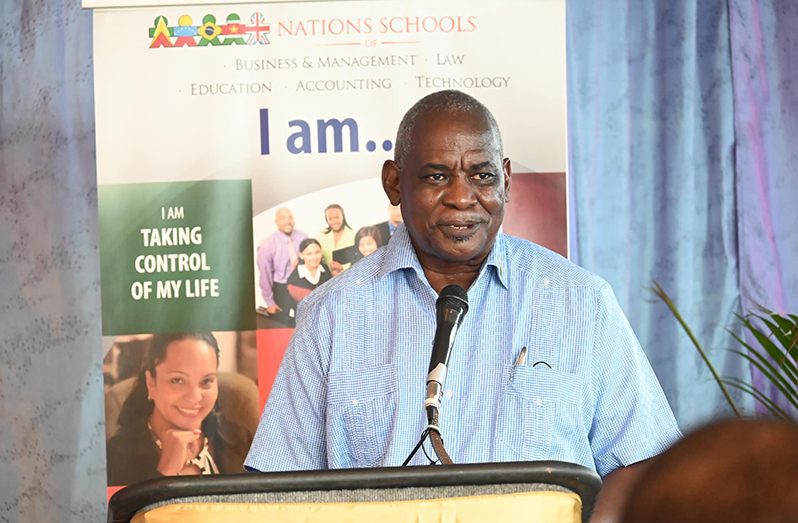WITH the intensification of the government’s efforts to combat the proliferation of illegal weapons in Guyana, Minister of Home Affairs, Robeson Benn, has adopted a resolute position by categorically rejecting any possibility of amnesty for individuals in possession of such weapons.
Minister Benn, while addressing the press conference on the ministry’s year-end review, advocated for the voluntary submission of illegal firearms to the nearest police station and highlighted the hazardous outcomes associated with possessing such weapons.
Refuting the notion of an amnesty, Minister Benn called for responsible actions, stating, “If you have an illegal gun, pass by the police station, put it in a bag, and throw it in the yard. You are not supposed to have any illegal guns.”
Speaking on the prevailing issue of gun crimes, Minister Benn remarked, “When we look at what is happening in Trinidad, Jamaica, and the Bahamas and some other places, the questions about having an illegal gun, in most instances, has nothing to do with being someone in the bush protecting their business. It has to do with criminal activities.”
The Minister pointed out that there has been a 17.9 per cent reduction in armed robbery as highlighted in the disturbing correlation between illegal guns and crimes against women and children, often linked to drug activities and organised crime.
To address this, he revealed the ministry is collaborating with international partners to amend legislation, proposing stricter penalties for individuals found in possession of illegal firearms.
“We don’t want to have a society in which people have guns all over the place. Too many instances, some of our people, even if they get a licensed gun, want to go into the beer garden or someplace, waving it around and showing that they got one.”
Expressing concern over individuals brandishing licensed guns in public places, he announced a review of gun licenses to address such behaviour.
“We will review those [gun licenses] to see what should be done in relation to some people who we know are doing nonsense,” Minister Benn affirmed.
Expressing concern over individuals obtaining bail for possessing illegal guns, Minister Benn emphasised the need to reconsider such cases.
According to Section 16(2) of the Firearms Act, if a person is found with a firearm in his possession without holding a firearm licence, they shall be liable on summary conviction to a fine of not less than $3,000 nor more than $15,000 together with imprisonment for not less than one year nor more than three years, and on conviction on indictment, to imprisonment for seven years.
The minister asserted, “There should be no bail given. I don’t know how people get bail for having an illegal gun. They shouldn’t be given bail.”
Both the Police Force and CANU have been actively engaged in efforts to decrease the accessibility and usage of firearms. However, the issue of firearm importation remains a concern. It is important to emphasise that Guyana does not produce firearms domestically, and all firearms are imported.
The Minister outlined the declaration of war on guns by CARICOM, which established a comprehensive approach to addressing gun crime in the Caribbean.
“Given the fact that we are perhaps more of a county where, as a result of the growth of our economy, we become perhaps…target for criminal activities beyond guns and other crimes, money laundering and so…“There has to be much more work to be done in identifying the areas where guns may come into the country and the fact that both the police and CANU have been seizing guns throughout the country from various persons who may either be committing crimes or hoping to commit crimes or protecting marijuana fields and other things,” the minister said.
CARICOM is currently working with the United States to combat illicit firearm trafficking in the Caribbean through a comprehensive approach that focuses on law enforcement.
Deputy Assistant Secretary of Defence for the Western Hemisphere at the United States Department of Defense, Daniel P. Erikson, during his recent visit to Guyana explained he views this issue primarily as a law enforcement challenge and is dedicated to providing the prosecutorial assets to investigate and prosecute cases of illegal firearm trafficking in the region.
During his two-day visit to Guyana, Erikson shared crucial insights into the US government’s approach to combating transnational criminal organisations involved in the trafficking of firearms.
The interview shed light on the significance of addressing this challenge not only as a military concern but also as a legal and law enforcement issue.
Erikson underscored the complex nature of the problem, stating, “The challenges posed by transnational criminal organisations are not just military challenges. They also require a whole-of-government response, working with our partners in the region.”
He highlighted the interconnectedness of illicit firearms trafficking with broader issues, such as the drug and narcotics trade, highlighting the need for a comprehensive strategy.
The Deputy Assistant Secretary of Defence acknowledged the prevalence of firearms trafficking throughout the Caribbean, linking it to criminal networks and transnational criminal organisations.
“We recognise that this is a big concern throughout the Caribbean, tied to illicit criminal networks and certainly linked to the overall drug and narcotics trade in the region,” he said.



.jpg)








